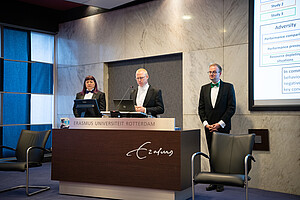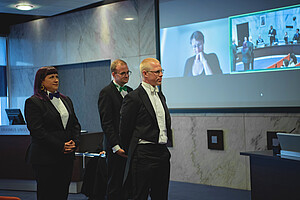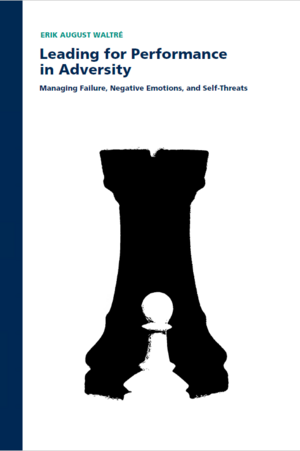PhD Defence Erik Waltré

In his dissertation 'Leading for Performance in Adversity Managing Failure, Negative Emotions, and Self-Threats' Erik Waltré investigated what leaders can do to help followers perform better in adversity, such as failure, negative emotions, and perceptions of self-threat. In jobs with more adverse experiences, working risks coming at the expense of both well-being and – paradoxically – performance. In those situations, leading for performance requires leaders to help followers deal more effectively with adverse experiences, and to minimize the distress that may otherwise be evoked by them. The prevalence of adverse situations inherent to many jobs highlights the importance for leaders in those situations to help followers minimize the negative consequences of adversity. Inspired by this challenge, the aim of this treatise is to investigate the role of leadership in assisting followers exposed to such adversity. Erik defended his dissertation on Thursday, 16 June 2022 at 10:30. His supervisors were Prof. Daan van Knippenberg (RSM) and Dr Bart Dietz (RSM). Other members of the Doctoral Committee were Prof. Steffen Giessner (RSM), Dr Inga Hoever (RSM), Dr Anja Van Den Broeck (KU Leuven), Prof. Stefano Puntoni (RSM), and Prof. Frank Belschak (University of Amsterdam).
About Erik Waltré

Erik Waltré (Stockholm, 1989) received his M.Sc. degree in Management at Stockholm School of Economics in 2015. Subsequently, Erik entered the doctoral program of the Erasmus Research Institute of Management, at RSM, Erasmus University. His principal advisors were Dr. Bart Dietz and Professor Daan van Knippenberg.
Erik’s research interests include the design of novel and evidence-based leadership trainings. Hence, interventions that actually show effective in the pursuit of achieving excellence in performance and wellbeing. Erik is interested in the role of leadership in situations of adversity. Erik has been involved in several industrial research collaborations, and his leadership trainings have been implemented in several organizations across countries and industries. Erik has presented his work at key conferences, such as the Academy of Management Annual meeting. Erik is currently employed as an Assistant Professor in the Department of the People & Organisations Department of Neoma Business School.
Thesis Abstract

The primary aim of this dissertation is to investigate what leaders can do to help followers perform better in adversity, such as failure, negative emotions, and perceptions of self-threat. In jobs with more adverse experiences, working risks coming at the expense of both well-being and – paradoxically – performance. In those situations, leading for performance requires leaders to help followers deal more effectively with adverse experiences, and to minimize the distress that may otherwise be evoked by them. The prevalence of adverse situations inherent to many jobs highlights the importance for leaders in those situations to help followers minimize the negative consequences of adversity. Inspired by this challenge, the aim of this treatise is to investigate the role of leadership in assisting followers exposed to such adversity. This dissertation comprises a programmatic research agenda that investigates how and when leaders may be effective in managing followers’ experiences of adversity. Across three studies, we develop insights about how and when key leadership behaviors in these situations can be effective in stimulating follower performance.
The first study is based on the observation that social comparison can be either a source of inspiration or a source of despair, depending on how people compare. We theorize that leadership can benefit follower performance by influencing follower performance comparisons. Results from a field experiment demonstrate that a training on managing follower social comparison was effective in stimulating follower performance but only when it was given in a context that aligned with the underlying leadership message.
In the second study, we consider the absence of performance effects in the emotion regulating leadership literature. We identify follower potential and comfortability to be influenced by emotion regulating leadership as two key factors that determine the effectiveness of emotion regulating leadership. Results from a field experiment demonstrate that a training on emotion regulating leadership only resulted in positive performance effects for followers scoring higher on either or both of those factors, as measured by performance pressure and psychological safety.
In the third study, we develop a conceptual model about how leaders can help prevent follower psychological resource depletion. In this theoretical paper, we propose that leaders can do so through the combination of two key behaviors: advocating an understanding to followers about how they can regulate their psychological resource depletion and coaching followers in their experiences of depletion regulation. We further propose that this leadership is more effective in more resource depleting situations.
View photos of Rolf's PhD Defence
Photos: Elise Ntoremi / Your PhD Photo


